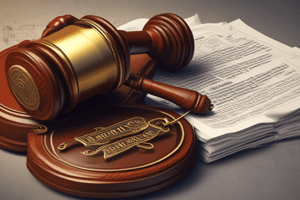Podcast
Questions and Answers
What are the three main purposes served by criminal procedure?
What are the three main purposes served by criminal procedure?
- To resolve state-citizen disputes, distribute power amongst state officials, and enforce criminal law
- To allocate scarce resources efficiently, resolve state-citizen disputes, and articulate fair process norms
- To enforce criminal law, allocate power to state officials, and articulate fair process norms
- To provide a process that vindicates substantive criminal law goals, allocate scarce resources efficiently, and distribute power amongst state officials (correct)
What is the article title and author mentioned in the text?
What is the article title and author mentioned in the text?
- Criminal Procedure Handbook
- Potchefstroom Electronic Law Journal 2020(23) 1-28
- Poverty as a Ground of Indirect Discrimination in the Allocation of Police Resources – A Discussion of Social Justice Coalition v Minister of Police 2019 4 SA 82 (WCC) (correct)
- Van der Linde DC
What is the role of criminal procedure in resolving state-citizen disputes?
What is the role of criminal procedure in resolving state-citizen disputes?
- To articulate fair process norms
- To allocate power to state officials
- To enforce criminal law
- To command the community’s respect for the fairness of its processes and outcomes (correct)
What is the subject of the prescribed Joubert Chapter 1?
What is the subject of the prescribed Joubert Chapter 1?
What does criminal procedure provide in terms of dispute resolution?
What does criminal procedure provide in terms of dispute resolution?
What are the three main purposes served by criminal procedure?
What are the three main purposes served by criminal procedure?
What is the state's duty in relation to criminal law according to the text?
What is the state's duty in relation to criminal law according to the text?
What is the role of criminal procedure in allocating resources efficiently according to the text?
What is the role of criminal procedure in allocating resources efficiently according to the text?
What is the purpose of criminal procedure in resolving state-citizen disputes according to the text?
What is the purpose of criminal procedure in resolving state-citizen disputes according to the text?
What is the significance of the Constitution in relation to criminal procedure according to the text?
What is the significance of the Constitution in relation to criminal procedure according to the text?
Flashcards are hidden until you start studying
Study Notes
Criminal Procedure
- Serves three main purposes: • Providing a framework for the investigation and prosecution of crimes • Regulating the exercise of State power over individuals • Resolving disputes between the State and citizens
Article Details
- Article title and author not specified in the text
Resolving State-Citizen Disputes
- Criminal procedure provides a mechanism for resolving disputes between the State and citizens
- It regulates the exercise of State power over individuals
Joubert Chapter 1
- Subject: Introduction to Criminal Procedure
Dispute Resolution
- Criminal procedure provides a framework for resolving disputes between the State and citizens
- It ensures that disputes are resolved in a fair, efficient, and transparent manner
State's Duty
- The State's duty in relation to criminal law is to investigate and prosecute crimes
Allocating Resources
- Criminal procedure helps allocate resources efficiently by providing a framework for the investigation and prosecution of crimes
Resolving Disputes
- Criminal procedure plays a crucial role in resolving disputes between the State and citizens by providing a fair and transparent mechanism
Constitutional Significance
- The Constitution plays a significant role in criminal procedure as it sets out the rights and protections of individuals
Studying That Suits You
Use AI to generate personalized quizzes and flashcards to suit your learning preferences.



